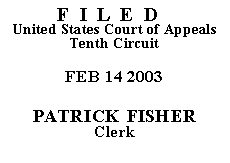

| TIMOTHY LAMONT JOHNSON,
v.
JOHN R. HEMINGWAY, Warden;
PHILL KLINE, Attorney General of
Kansas |
|
In 1993, Petitioner pled guilty to state charges of cocaine possession and obstruction. Petitioner filed a motion in 1999 to withdraw his guilty plea based upon an alleged deficiency in the state court's receipt of the plea. The Kansas district court denied the motion, and the Kansas appellate courts affirmed. Johnson completed his state sentence and is now in federal custody. On December 12, 2001, Johnson filed a petition for a writ of habeas corpus pursuant to 28 U.S.C. § 2254, challenging his prior state conviction. In his § 2254 petition, Johnson claimed that the state courts erred in denying his motion to withdraw his plea. Although Johnson was no longer in state custody when his § 2254 petition was filed, he claimed that he could still attack the state conviction because it affected his current federal sentence. The district court dismissed the case for lack of jurisdiction.
The Antiterrorism and Effective Death Penalty Act ("AEDPA") provides that a challenge to detention arising from a state court decision may not be appealed unless a COA is granted. 28 U.S.C. § 2253(c)(1)(A). A COA may be issued "only if the applicant has made a substantial showing of the denial of a constitutional right." § 2253(c)(2). Because the district court denied Johnson's motion for a COA, we proceed to analyze whether a COA should have been granted.
Under § 2254, this court shall "entertain an application for a writ of habeas corpus in behalf of a person in custody pursuant to the judgment of a State court only on the ground that he is in custody in violation of the Constitution or laws or treaties of the United States." § 2254(a). Petitioner has completely served his state sentence, and thus he is no longer "in custody pursuant to the judgment of a State court." A prisoner who has completely served his state sentence is not entitled to habeas relief under § 2254 even if, as Johnson summarily alleges here, R. Doc. 2 at 2, the state sentence affected the calculation of his federal sentence. Brown v. Warden, --F.3d--, 2003 WL 23119, at *1 (10th Cir. Jan. 2, 2003). The only exception to this rule is where a prior conviction is challenged for failure to appoint counsel, see Custis v. United States, 511 U.S. 485, 496-97 (1994), but Petitioner makes no such claim here. Accordingly, the district court lacked jurisdiction to entertain Johnson's § 2254 petition.
There is insufficient information in this petition to recharacterize it as a 28 U.S.C. § 2255 petition, even under the obligation to construe pro se filings liberally. See Brown, 2003 WL 23119, at *2. We have no reason, apart from Petitioner's passing assertion, to believe that the prior state conviction was used to increase Petitioner's federal sentence. Indeed, it is unclear from the briefs submitted or the record before us why Petitioner is in federal custody.
The application for COA is DENIED and the appeal is DISMISSED.
Entered for the Court
Paul J. Kelly, Jr.
Circuit Judge
*. This order and judgment is not binding precedent, except under the doctrines of law of the case, res judicata, and collateral estoppel. This court generally disfavors the citation of orders and judgments; nevertheless, an order and judgment may be cited under the terms and conditions of 10th Cir. R. 36.3.
**. After examining the briefs and the appellate record, this three-judge panel has determined unanimously that oral argument would not be of material assistance in the determination of this appeal. See Fed. R. App. P. 34(a); 10th Cir. R. 34.1(G). The case is therefore ordered submitted without oral argument.